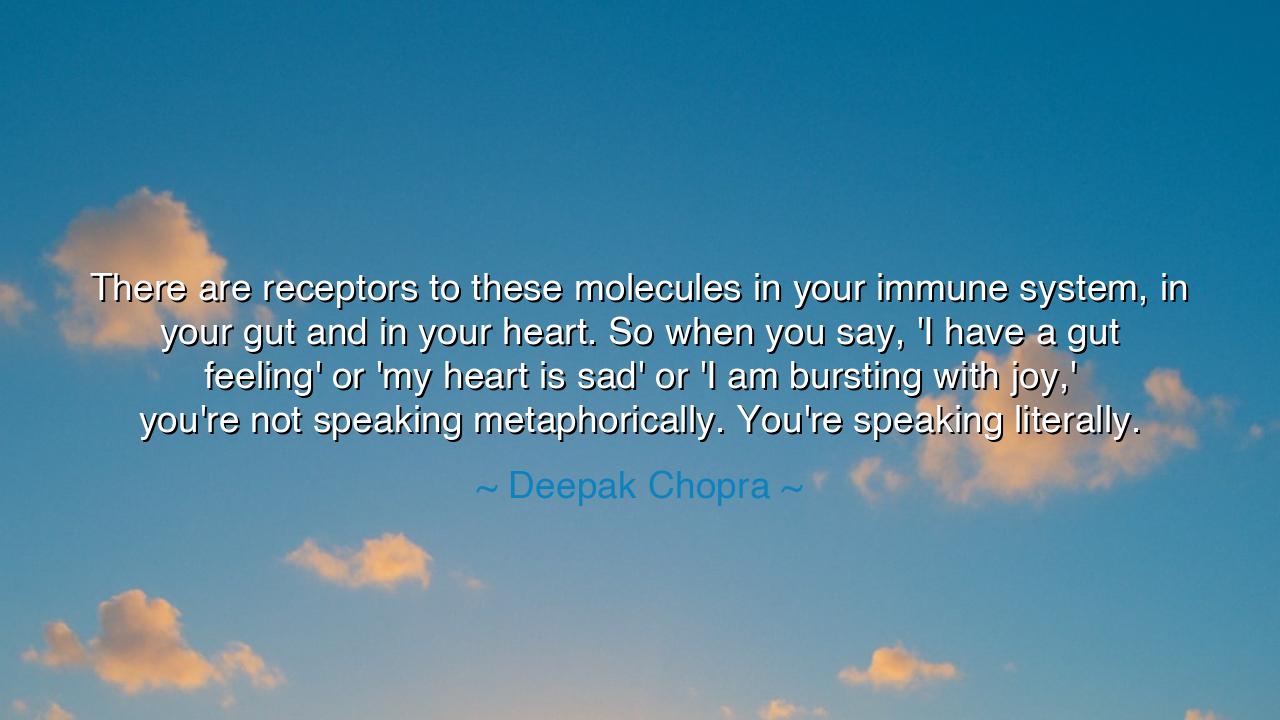
There are receptors to these molecules in your immune system, in
There are receptors to these molecules in your immune system, in your gut and in your heart. So when you say, 'I have a gut feeling' or 'my heart is sad' or 'I am bursting with joy,' you're not speaking metaphorically. You're speaking literally.






In the profound and luminous words of Deepak Chopra, there resounds a harmony between science and spirit: “There are receptors to these molecules in your immune system, in your gut and in your heart. So when you say, ‘I have a gut feeling’ or ‘my heart is sad’ or ‘I am bursting with joy,’ you’re not speaking metaphorically. You’re speaking literally.” This revelation, though wrapped in modern language, awakens an ancient knowing — that the body and the soul are not separate, but threads of one woven tapestry. The mind does not float above the flesh; it sings through it. The heart, the gut, the immune system — these are not mere organs of survival, but instruments of feeling, wisdom, and divine intuition.
In this saying, Chopra bridges the world of mystics and the world of medicine. He reminds us that when we feel emotion, we are not dealing with a ghostly thought, but with the tangible language of our cells. Science, through its instruments, has found what sages once intuited in silence — that emotion is embodied, that joy, sorrow, and intuition have chemical roots and biological resonance. When the heart aches, it is not poetry alone; the muscles truly tighten, the pulse slows, and the brain releases signals of grief. When the gut warns us, it is not superstition; the enteric nervous system — a vast network of neurons in the belly — stirs with its own intelligence. Thus, the body speaks the truth the mind often ignores.
The ancients knew this long before laboratories confirmed it. The Greeks spoke of the thymos — the seat of spirit and courage — as residing in the chest. In China, the philosophers of Tao understood the heart as the house of consciousness, the bridge between Heaven and Earth. And in India, where Chopra’s spiritual lineage begins, the chakras were said to align the physical and spiritual energies within the body. What modern science calls receptors and molecules, the ancients called prana, chi, and soul-force. Though their languages differ, their truths converge: that human life is not merely mechanical, but a symphony of energy, emotion, and awareness.
Consider the story of Florence Nightingale, the “Lady with the Lamp,” whose compassion transformed the face of medicine. She once said, “Variety of form and brilliance of color in the object presented to patients are actual means of recovery.” She understood — without the language of neuroscience — that the mind and body heal together. Her patients recovered not only because of care and cleanliness, but because she restored to them hope, beauty, and connection — emotional energies that awakened the healing power within their own cells. Nightingale’s lamp, like Chopra’s words, reminds us that to heal the body, we must also tend the heart.
This truth is both humbling and empowering. It means that our emotions are not separate from our biology — they shape it. Every thought, every feeling, sends ripples through the vast sea of our being. Anger tightens arteries; gratitude opens them. Fear weakens the immune system; laughter strengthens it. Our words, our beliefs, our inner songs are messages written into the very molecules that sustain us. The old mystics were right: to master the spirit is to master the flesh, and to heal the mind is to heal the body.
Thus, when Chopra tells us that saying “my heart is sad” or “my gut tells me so” is literal, he is calling us back to awareness — to listen deeply to our inner signals, for the body never lies. The heart that races before danger, the stomach that tightens before betrayal, the tears that cleanse after sorrow — these are not mere side effects of emotion; they are the wisdom of the body itself, speaking in its native tongue. To ignore these signals is to turn deaf to one’s own truth; to honor them is to live in harmony with the whole self.
So what lesson can we draw from this union of science and soul? It is this: Live consciously within your body. When sadness arises, do not suppress it; breathe through it and let it teach you. When joy comes, feel it fully, let it flood your heart and strengthen your being. Eat not only with hunger, but with mindfulness; speak not only with intellect, but with compassion. For every act, every word, every feeling shapes the internal symphony that is your life.
In the end, Deepak Chopra’s words restore what modernity has divided. The body is not a machine; it is a vessel of consciousness. The heart does not merely pump blood; it speaks of love. The gut does not merely digest; it discerns truth. When we live with this awareness, we rediscover what the ancients knew: that to feel is to know, that to heal is to listen, and that the greatest wisdom is not found in books or theories, but in the silent messages that rise from within — from the gut, from the heart, from the sacred, living temple that is the human body.






AAdministratorAdministrator
Welcome, honored guests. Please leave a comment, we will respond soon